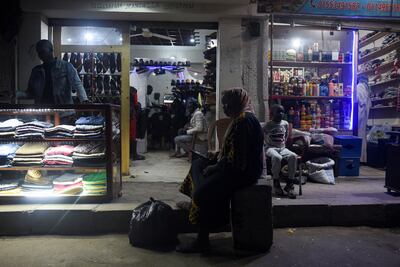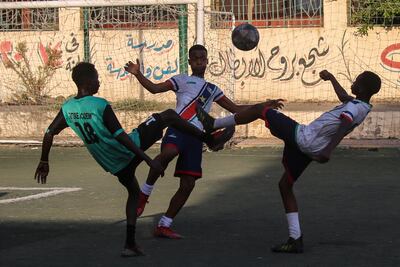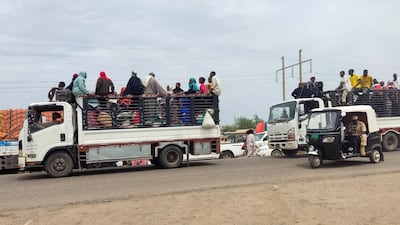Egypt is toughening its stance on migration, specifically targeting the Sudanese – who, at more than four million, are by far the largest single group in the country – in a government campaign to regulate the stay of nine million foreign residents.
Egypt has historically been a magnet for migrants and refugees, taking in hundreds of thousands of Arabs, sub-Saharan Africans and Europeans fleeing wars, colonial rule or persecution over the years.
More recently, Iraqis, Syrians and Yemenis arrived in Egypt in droves to escape conflict in their respective countries. In the 14 months since war broke out in Sudan between the army and a powerful paramilitary, more than one million Sudanese are estimated to have come to Egypt.
The war in Sudan has displaced more than eight million people, of whom about two million have sought refuge in neighbouring nations, mainly Egypt, Chad and South Sudan, according to figures from UN agencies.
Of the estimated one million who went to Egypt, between 500,000 and 600,000 are thought to have illegally crossed into the country, making the perilous journey across the desert with smugglers charging 300,000 Sudanese pounds (about $500) per person, according to migrants.
Scores have perished from heat stroke or thirst during the journey – which is mostly made in the back of pickup lorries without any cover to shield them from the sun or sand. The difficulty of obtaining a visa to enter Egypt has pushed them to take this route.
In recent weeks, Egypt has deported hundreds of Sudanese migrants who entered the country illegally.
In districts of Cairo where the Sudanese are known to live in large numbers, police stop them on the street to check their immigration documents are in order.
Anyone who cannot prove legal residence is arrested and deported, a practice that has forced many to stay home and venture out only when necessary.
Several Sudanese schools in Cairo have also been shut down by authorities for not having permits or because the premises are said to not meet health and safety requirements. Similarly, unlicensed food stores or cafes serving Sudanese food and goods have also been closed.
A deadline given by Egyptian authorities to foreign nationals to legalise their immigration status expired on July 1, raising concern among the Sudanese community of a dramatic intensification of the crackdown on illegal residents.
On social media, Egyptians are criticising the presence of the Sudanese in some Cairo districts, blaming them for soaring apartment rents and shaming them for taking advantage of state subsidies on basic items and services.

Milad Hanna, a rights lawyer specialising in migrants’ affairs, says the predicament of the Sudanese in Egypt has been worsened by the waiting period – which sometimes can be months – before they can visit a UN refugee agency bureau or state immigration office to regulate their status.
About 200,000 Sudanese are on the waiting list to register as refugees or asylum applicants with the UNHCR, the UN’s refugee agency, Mr Hanna said. He also said he disapproves of police stopping people on the streets and arresting those whose residence permits have expired.
“This campaign looks like it will last a long time,” he said. “Demanding to see proof of valid residence or visa should only be done in the case of a public disturbance or cases of blatant lawbreaking.”
Nasser Mohammed Nasser says he, his wife and three children crossed illegally into Egypt last year after months of waiting in vain for an Egyptian visa. The family began the journey in Sudan’s northern city of Wadi Halfa and arrived in Aswan, Egypt’s southernmost city, three days later.
“We registered with UNHCR in Cairo but we are still afraid to leave our home after we heard so many stories about Sudanese getting arrested on the street and deported.
“We lost everything we had in Khartoum. As Sudanese, Egypt is the closest country to our heart. We are emotionally attached to Egypt through language, religion and common history. Life is tough here, but it’s much tougher back in Sudan,” he said.

Egypt and Sudan have had close social, economic and cultural ties dating back to Pharaonic times. The two nations in north-east Africa were one nation until 1956, when Sudan voted for self-determination at the end of Anglo-Egyptian rule.
Sudan's secession, however, has not broken the two Nile-basin nations' close ties, with visa-free travel between the two nations cementing their bonds.
However, the two countries have an unresolved border dispute that occasionally surfaces and sours relations. Moreover, some Sudanese, especially leftist and nationalist politicians, are resentful of what they see as Egypt’s constant meddling in the affairs of their country.
Osman Al Mirghani, a prominent Sudanese newspaper publisher and analyst who now lives in Cairo, suspects that the Rapid Support Forces, the paramilitary fighting the army in Sudan, may be behind the social media campaign against Sudanese in Egypt.
“It has a very destructive effect on relations and it comes at a very sensitive time,” Mr Al Mirghani said. “The majority of Sudanese prefer Egypt over anywhere else in the region or in the West.
“They have realised after coming to live here that relations between Egypt and Sudan are much better than they had previously thought,” said Mr Al Mirghani, who has lived in Cairo since 2023.
Egyptian President Abdel Fattah El Sisi makes a point of calling foreign residents in Egypt “our guests” and often boasts that, unlike elsewhere in the region, his country allows migrants to work and live alongside Egyptians, and does not keep them in camps.
It costs the Sudanese the equivalent of $25 to secure a six-month stay in Egypt.

However, the Egyptian leader has recently talked about the cost of hosting such a large community of foreign residents. That, in turn, may have inadvertently fuelled xenophobia at a time when most Egyptians are struggling to make ends meet amid a grinding economic crisis.
Last month, Mr El Sisi said hosting foreign nationals in Egypt costs the treasury $10 billion annually. They consume 4.5 billion cubic meters of water per year, he added, alluding to Egypt having one of the world’s lowest per capita shares of fresh water at 500 cubic metres a year.
However, some Sudanese people, such as Cairo-based businessman Yasser Abdallah, are convinced that Egypt remains the only country apart from home where he and his compatriots feel comfortable.
“Many of us behave randomly and sometimes forget that we are not in Sudan,” he said. “Every non-Egyptian here is treated as a foreigner except us. On the border with Egypt, the Egyptians treat us better than the Sudanese do on our side of the border.”
However, some Sudanese report racially motivated, minor acts of violence by Egyptians against members of their community, but they insist they remain isolated incidents rather than a trend.

